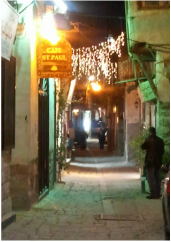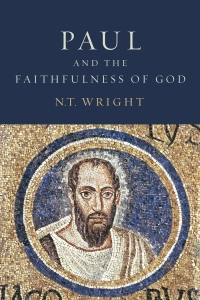|
|
 St. Paul Cafe Damascus, Syria 2011 St. Paul Cafe Damascus, Syria 2011 We don’t tell the truth enough. We don’t explain to young, idealistic called persons how hard it will be to follow God. We don’t make it plain to them that they will struggle and fall and inevitably lose their way, or at least become unsure of it. We tell them they’re special, fill them with sermons on purpose and providence but we forget to say, life will take you places you don’t want to go; your heart will shatter into a million pieces more than once and you will look up and wonder where it’s all coming from and where your provision has gone, how it was that your favor wore off and you will realize that you are flesh and blood, you will hurt and you will bleed and you will know for certain that you are real. It is the gift of Paul’s life really, the testament of a broken body and spirit, staring back at us from the pages of scripture that we’ve picked clean for rules and regulations. This holy writ that we have too long understood as a book of answers rather than an extension of divine love, the presence of God scribbled down in ink, preserved across the ages, a song that dances in the wind to remind us we are not alone. This Paul who never had a success in the span of his life, this one who was made blind so he could see, was beaten and bruised and scarred and poured out every drop of life left in him for the good of the church and never, not once, was able to look back over his shoulder and say, “there” that’s all good now. Though we speak of the New Testament church as the model of goodness and grace, let’s be clear, that’s not what the letters convey. Everything Paul planted, all he put in place, everyone he ever trained got confused, felt wrung out, came to themselves and realized they were unsure and Paul, their mother would get word and he’d have to scratch out a letter laced with love and venom to call them to themselves, to help them recall the good news they had known. According to Jerome Murphy O’Connor, the “thorn” in Paul’s flesh was his people, the ones he loved, poured himself into, gave his life for; the people that he saw birthed into the kingdom who would question his truth as soon as he left town. I guess what I’m saying is, we are not the first people to have obstacles in ministry. We are not the first ones to find ourselves shipwrecked at sea on the way to some critical encounter, we are not the only people who have ever left a meeting that didn’t go our way, we are not the first souls bitten by betrayal and we will not be the last. So let’s be honest. Let’s tell the truth as Qoheleth did (the female gatherer that we have falsely identified as King Solomon), life is hard and most of the time it doesn’t make much sense, but God is near. “Write the hard stuff” they say, this is what the people need. And tell them, don’t forget to tell them about this ineffable grace, sing the song of this love that will not let us go even unto our own selves.
0 Comments
 Stripped Love, telling our story, listen to this CBH Viewpoint broadcast on how it all began. If you'd like to be a part of what we're doing; message me here!  As the new semester dawns, so do all my dreams about inviting students into the Holy Scriptures in ways that will stun and amaze them. The truth is, there is so much there to discover;courage and scandal, faith and mystery. One of my favorite courses to teach has been the Introductory to the Bible seminar required for all non-majors at my confessional school. Every semester, some disinterested 18-22 year olds would register for my course; a number of whom were unsure of who Moses was, others who thought this a waste of their time because they’d been reading the bible since childhood, and still others who needed a nice nap before facing the rest of the day. To date, there are few thrills that compare to watching intrigue mount in the heart and eyes of a student who for the first time really engages the ancient text and finds out, there’s something powerful there. As a way of beginning discussion, drawing from Barbara Brown Taylor a literary mentor of mine, I always ask them to start in the beginning and tell me the story of the fall. Most feel confident with the tenants of this epic universal narrative; a husband and wife in the Garden of Eden, the woman is seduced by Satan and in turn seduces her husband, they eat the forbidden apple and, sinning are cursed and cast out of the garden. I ask my students then, to go home and underline in their bibles or highlight on their iPads the words, husband and wife, apple, seduction, Satan and sin. Inevitably they return, astonished because they didn’t find the words, they didn’t see what they thought had been there. In fact, Adam and Eve never have a wedding ceremony; the serpent is never called Satan and, seduction or sin-- never mentioned. I tell my students, they have a very important decision to make in studying scripture; they must decide that they will strip away all the layers of stuff they “thought” was in the text and instead, allow the text to stand as it is and to join me to struggle and grapple through centuries of context so we might glean the meaning of the words, the nuances, the gaps and the community understanding across the ages of texts that have instructed the faithful for millennia. This is why study is imperative, this is why I love what I do; we must strip away preconceived notions and engage the text in an informed and open way. Otherwise, the result is an uneducated church who touts “biblical” imperatives without understanding the intent of the texts they breathe with red hot fire. The result is crazy notions of rules of submission between genders drawn from the original Empire itself and Roman household codes. The danger is that we apply modern paradigms to categories that did not exist in the ancient world.The danger is that we domesticate a text so we might apply it before we understand that it is wild and free and centered on the radical love of God. How do we bridge this gap, how do we invite persons of faith into real and in-depth study of the texts they venerate. I wonder what would happen if we began to offer small group studies on life in Ancient Israel, if we spent time teaching the difference between Hebrew and Greek world view, understanding Latinisms and Roman household codes, oral tradition and the formation of the canon; if we decided we’d help people understand the texts they love so much. How about a Sunday School session on “What is not nor has ever been in the Bible?’ What if teaching context, time and space returned as work of the church rather than limited to the realm of the academy? Perhaps this is how we serve one another and resume the holy enterprise of building up the kingdom.  Looking forward to a new semester! Welcome back students!! Follow this link for History and Literature of New Testament II Course syllabi https://sites.google.com/a/anderson.edu/kimberly-s-majeski/bist-6220-1  An excerpt from my book, "Stripped: A Theological Memoir" I don’t know how it happened, maybe it’s because there aren’t enough women in the pulpit, maybe it’s because of the good old fashioned notion of American progress, but most of us have bought into the lie that we’re not good enough and that God’s love must be earned through achievement and piety, self-denial and aesthetic prayer. For most of my life I’ve been trying to earn God’s love just like another degree to hang on my wall... Worth can be measured in a myriad of ways. For some women it’s finding a mate, raising perfect children, making the best most mouth watering pie, having the most beautiful home, writing the great American novel, becoming an ordained clergy, or running a Fortune 500 company. Whatever it is for you, most of us have bought into the same lie as my friends who work in the clubs; we’re afraid we’ll never be good enough; we believe we are unworthy of love. Here's what I want to say that just maybe you haven't heard before; you ARE Worthy because you are God's. This is why Jesus came, not so much to purge us from sin as to demonstrate unrelenting, uncondintional, two hundred and twenty second chance divine love. That's the difference between the Jewish and subsequent Christian understanding of Jesus. In the Judeo understanding the Messiah was to rid the world of pain, suffering, disease, death. When people continued to die, when women continued to have menstrual cycles, when sickness did not relent many Jews were convinced Jesus of Nazareth was not the one. For those of us who have placed our faith in this Jesus, we find the one who came to take his place among us; to be with us in the suffering, to submit to the cross, to grieve in the garden, to walk through the hard stuff by our side, to hold us up in hospital rooms, to love us through the cold sting of death, to wipe our brow and rub our backs as we labor to birth forth new life; to remind us in our brokenness, in our battle scarred bodies, in our self destruction we are loved. After all, it’s what all of us need to know isn’t it? To believe that right now in the midst of whatever circumstance, in the middle of our own self-created wreckage, no matter where we’ve been or what we’ve done, God loves us. We are worthy because it’s not what we've done or failed to do but it is God’s love that makes the difference.  Very early in my childhood, I drew a scene snatched from the pages of the bible, the one my mother used to read from and out of which came the stories she regaled to us in our Wednesday night junior bible class. Born and raised in East Tennessee, my mother had a way with words; she could spin a tale that would leave you, mouth gaping wide, mind whirling at the wonder of it all. Her faith a fusion of Missionary Baptist holiness, Cherokee mysticism and mountain magic all rolled into one.I would get lost in her stories just like in her red high heel shoes, they were too big, but I was fast growing into them. Once after class, I drew what I saw in my infant imagination, put pen to paper and allowed the images to come to life. I drew reeds, tall and slender, spikey and bent; colored them in with the vibrant hues of the Nile delta, emerald, azure, magenta, as it existed in my mind. The papyrus reeds peeled back ever so slightly to reveal the babe in the basket afloat on the river deep and wide. What I know now is that I heard the story, saw the scene unfold through the eyes of Miriam and looked on from some place of deep knowing as a young girl, the older sister called upon to care, watch over, yet surrender the baby to the God of the river. What I know now is I was exercising a hermeneutical lens, asking myself, “where do I stand in this text” so that I could find my way, move around in it, deep resonate with its meaning. The story, clearly about Moses the one sent by God to deliver the Hebrew children from the bondage of Egypt, was experienced differently for me. As a woman, the story reverberated inside my own chest, I leaned into it and saw behind and up under it as I stretched into the skin of it and saw it all unfold from the banks of the Nile feet wet from standing too close to the edge, heart skipping beats. The Holy Scripture has always called this out of me since the canon as we now have it is for the most part a collection of narratives recorded, copied, edited and compiled by men who live many centuries after those women and men whose stories they are trying to convey. And so, to find my own way I have needed to press beyond the text, delve deep into culture and context to find my imaginings real or renegade. Studying Scripture as women then, requires much of us, we must know ourselves and the perspective, the pain, the hope, the needs we bring to the text, and we must, as much as we are able know of the time, the place, the culture and conditions of the women remembered forever in the ancient writ so that we might know them and remember we are not alone. At the start of this New Year, on the blog we embark upon the study of women, written into history as harlots, remembered for the role they play in God’s redeeming plan. As we explore together, we’ll become aware at the prevailing theme it is to find women of scandal drawn right into God’s work of hope across the ages and perhaps we might find more grace for women driven to desperate measures in our own world. |
Subscribe Today for Free GiftBLOG
Archives
June 2019
Categories
All
|

 RSS Feed
RSS Feed